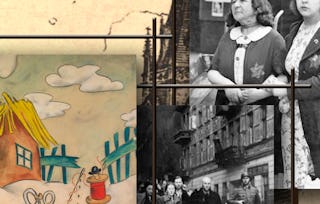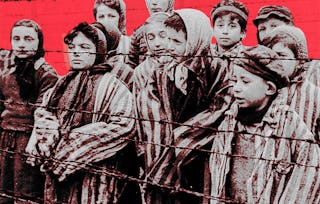In this new online video course produced by EHRI, the European Holocaust Research Infrastructure, we will explore diaries, photographs, official Nazi documents, postwar survivor testimonies and much more - all together with leading scholars in the field. We will become acquainted with original documents and gain hands-on experience in using them while learning about their importance, and the unique perspectives they provide us into this cataclysmic event.

The Holocaust through the Perspective of Primary Sources
12 reviews
Skills you'll gain
Details to know
See how employees at top companies are mastering in-demand skills

There are 6 modules in this course
Welcome to the online course "'It Must All Be Recorded Without a Single Fact Left Out': The Holocaust through the Perspective of Primary Sources" for EHRI, the European Holocaust Research Infrastructure. Yad Vashem is one of 26 EHRI partners, and tasked with creating and operating the course. In this first short week, we will introduce the subject of Holocaust research and study using primary sources, including some of the main issues within this domain.
What's included
4 videos4 readings2 discussion prompts
This week, we will learn about researching and studying the Holocaust using diaries as unique historical sources. We will demonstrate these through the diaries of Adam Czerniakow and Emanuel Ringelblum, among others.
What's included
13 videos1 reading2 discussion prompts
This week, we will learn about the use of photographs and images as tools in documenting and commemorating the Holocaust, and as historical sources, through the photographs of two photographers active in the Lodz Ghetto: Walter Genevein, a Nazi official, and Mendel Grossman, a Jew incarcerated in the ghetto.
What's included
6 videos2 readings2 discussion prompts
This week, we will learn about researching and studying the Holocaust using German bureaucratic sources. We will focus on four German bureaucratic source types relating to specific aspects and stages of the Holocaust: Situation Reports; documents on the confiscation of Jewish property; Einsatzgruppen reports; and documents on the deportation process.
What's included
12 videos2 readings1 discussion prompt
This week, we will learn about researching and studying the Holocaust using personal letters written immediately after liberation. We will examine such letters' significance in Holocaust research and studies, the motives of their writers, and their main themes.
What's included
8 videos2 readings1 discussion prompt
This week, we will learn about researching and studying the Holocaust using testimonies of survivors. These testimonies include early accounts submitted closer to the time of the events themselves, as well as later ones. We will explore questions and arguments regarding the use of testimonies as historical sources, their significance, and the invaluable perspective they offer, especially concerning topics where other source types are lacking.
What's included
7 videos2 readings1 peer review2 discussion prompts
Instructor

Offered by
Explore more from History
 Status: Free
Status: FreeYad Vashem
 Status: Free
Status: FreeTel Aviv University
 Status: Free
Status: Free Status: Preview
Status: PreviewUniversity of California, Santa Cruz
Why people choose Coursera for their career

Felipe M.

Jennifer J.

Larry W.

Chaitanya A.
Learner reviews
- 5 stars
91.66%
- 4 stars
0%
- 3 stars
0%
- 2 stars
0%
- 1 star
8.33%
Showing 3 of 12
Reviewed on Nov 25, 2025
Lot of information ,different teacher, different tones, and view points from different professor

Open new doors with Coursera Plus
Unlimited access to 10,000+ world-class courses, hands-on projects, and job-ready certificate programs - all included in your subscription
Advance your career with an online degree
Earn a degree from world-class universities - 100% online
Join over 3,400 global companies that choose Coursera for Business
Upskill your employees to excel in the digital economy
Frequently asked questions
To access the course materials, assignments and to earn a Certificate, you will need to purchase the Certificate experience when you enroll in a course. You can try a Free Trial instead, or apply for Financial Aid. The course may offer 'Full Course, No Certificate' instead. This option lets you see all course materials, submit required assessments, and get a final grade. This also means that you will not be able to purchase a Certificate experience.
More questions
Financial aid available,
¹ Some assignments in this course are AI-graded. For these assignments, your data will be used in accordance with Coursera's Privacy Notice.

